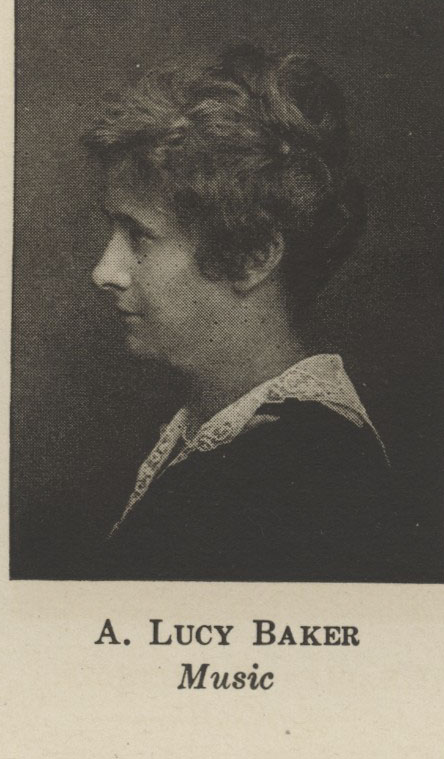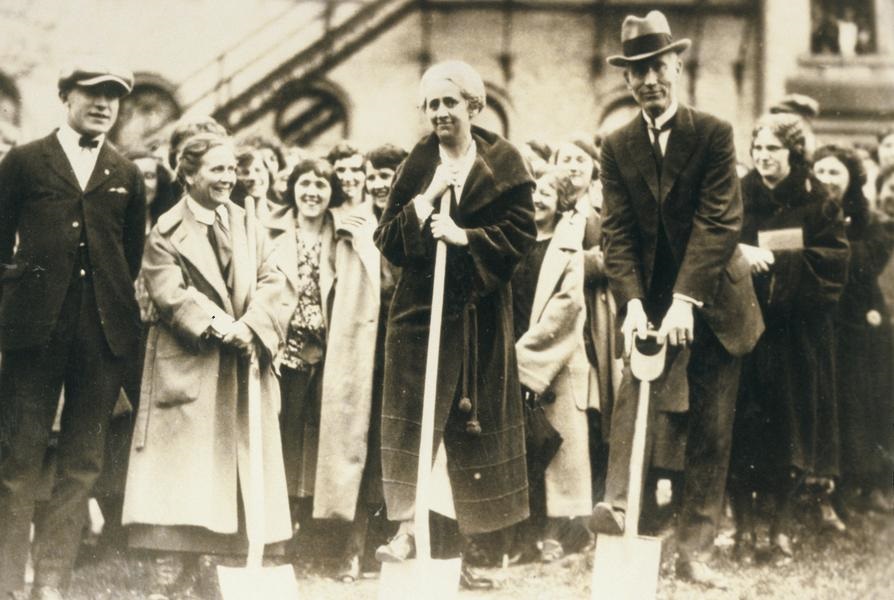Lucy Baker arrived at Whitewater Normal School (now UW-Whitewater) in 1894 and taught for 43 years. She was initially hired as the school’s music teacher, but quickly accomplished much more. Some of her first achievements were organizing the school’s first glee club in 1903, and a girl’s chorus group called “Treble Clef” in 1909.[1] Since, “soon after the turn of the century the term ‘music department’ came into use to refer to the combined efforts of all group that performed for the benefit of the institution” Miss Baker organized a full band and orchestra in 1912. [2] Throughout the 1920s and 1930s Miss Baker continued to expand the music department. The Glee Club ranged from 30 to 90 students at any given point and began meeting at after school rehearsals. An A Capella Choir was formed as well as another Choral Club that became known as the “little sister” to the Treble Clef group. [3] The music department received a promotion in 1931 as all extracurricular music activities were put on a credit basis.”[4] Shortly before Miss Baker retired in 1937, a Piano Club was founded in 1934. This club eventually became Zeta Eta Theta in 1941.[5] Miss Baker was also influential for all women on campus. When the first two female basketball teams were formed in 1899, Miss Baker was one of the first supporters.[6]

Lucy Baker returned to campus February 18, 1952 to celebrate the building of a new dormitory that would be named in her honor. The ceremonies were arranged by the Women’s Self-Governing Association and included a parade of the Independent Women and each sorority represented by 15 girls, and were preceded by six trumpeters. The parade went from the Graham Street Entrance to the site of the dorm.[7]

The Student Involvement Award has recently been renamed to reflect the legacy Lucy Baker left on UW-Whitewater. The Lucy Baker award is “presented to less than 1% of UW-Whitewater undergraduate students who have served campus and surrounding community in an exemplary fashion.”[8] The students who are awarded this honor are noted for their active leadership and “providing service and programming for their peers, much how Lucy did for her students.”[9]

[1] M. Jannette Bohi, A History of Wisconsin State University Whitewater 1868-1986 (Whitewater: Whitewater State University Foundation Inc., 1967), 86.
[2] M. Jannette Bohi, A History of Wisconsin State University Whitewater 1868-1986 (Whitewater: Whitewater State University Foundation Inc., 1967), 87.
[3] M. Jannette Bohi, A History of Wisconsin State University Whitewater 1868-1986 (Whitewater: Whitewater State University Foundation Inc., 1967), 168.
[4] M. Jannette Bohi, A History of Wisconsin State University Whitewater 1868-1986 (Whitewater: Whitewater State University Foundation Inc., 1967), 168.
[5] M. Jannette Bohi, A History of Wisconsin State University Whitewater 1868-1986 (Whitewater: Whitewater State University Foundation Inc., 1967), 168.
[6] M. Jannette Bohi, A History of Wisconsin State University Whitewater 1868-1986 (Whitewater: Whitewater State University Foundation Inc., 1967), 111.
[7] M. Jannette Bohi, A History of Wisconsin State University Whitewater 1868-1986 (Whitewater: Whitewater State University Foundation Inc., 1967), 196.
[8] “Campus Awards,” University of Wisconsin Whitewater james R. Connor University Center, Univeristy of Wisconsin Whitewater, effective 2022, https://www.uww.edu/uc/get-involved/campus-awards#lucy-baker-involvement-award.
[9] “Campus Awards,” University of Wisconsin Whitewater james R. Connor University Center, Univeristy of Wisconsin Whitewater, effective 2022, https://www.uww.edu/uc/get-involved/campus-awards#lucy-baker-involvement-award.
